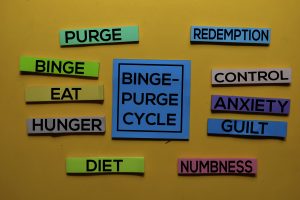Bulimia Treatment
Counseling for Bulimia in Indianapolis, IN is Available at Northside Mental Health
Does this cycle sound familiar?
You are unhappy with the way you look. So, you decide to cut back on calories. Maybe even cut out an entire meal or two in order to lose weight. After a while, your hunger and lack of energy, caused by your restriction, take over. Now, with little or no sense of self-control, you find yourself eating way more calories (sometimes even way, way, more calories) than you are comfortable with.
You’re not sure what to do about this problem with food
Now, you’re feeling panicked about inevitable weight gain. With this panic from all the food you consumed, you decide that you must do something, anything, to compensate for all those calories. So, you find yourself engaging in self-induced vomiting. Doing this purge, you try to clear out of all the unwanted food in your stomach. Exhausted and ashamed, you vow to “do better next time”. Maybe, you’ll be more disciplined about calorie restriction. Or, you’ll employ more will power against the temptation of “off-limits” food. Then, without fail, this further limitation of food results once again in binge behavior, starting the cycle over.
Individuals stuck in this cycle might be struggling with bulimia nervosa.
When dealing with bulimia, you may experience episodes of out-of-control eating followed by behavior intended to compensate for calories consumed. Forms of calorie compensation can vary for those struggling with this disorder. When dealing with bulimia, you don’t always have to count calories, but it does require an obsession with food and weight loss behaviors. These behaviors can range from self-induced vomiting, laxatives or diuretics, over-exercise, or fasting.
This battle with bulimia doesn’t have to be your entire life. Therapy for eating disorders can help you.
Our eating disorder specialists here at Northside can help you find freedom from these behaviors and thoughts. We will work with you to set goals to disrupt the binge, purge cycle. Further, we can help you develop the skills necessary to change the unhealthy and distorted thought patterns associated with bulimia. Finally, support and resources are offered to prevent a relapse of bulimia symptoms.
We know that eating disorder treatment is a team effort, so we will also work with other care providers and your loved ones to give you the best possible support. Your recovery journey will be a time for honest and heartfelt conversations that can leave you all stronger than before.
In addition to bulimia treatment, our therapists can help with:
GROUPS, WORKSHOPS, AND EVENTS FOR BULIMIA RECOVERY
 Northside offers other recovery-oriented services in addition to traditional therapy. Your participation in groups can help boost support in the process of recovery.
Northside offers other recovery-oriented services in addition to traditional therapy. Your participation in groups can help boost support in the process of recovery.
Group therapy, dietician facilitated restaurant outings, recovery coach services, and peer-led support groups are just some of the additional services offered here. Ask your provider or check out our calendar of events to learn more and see when these other services are offered.
